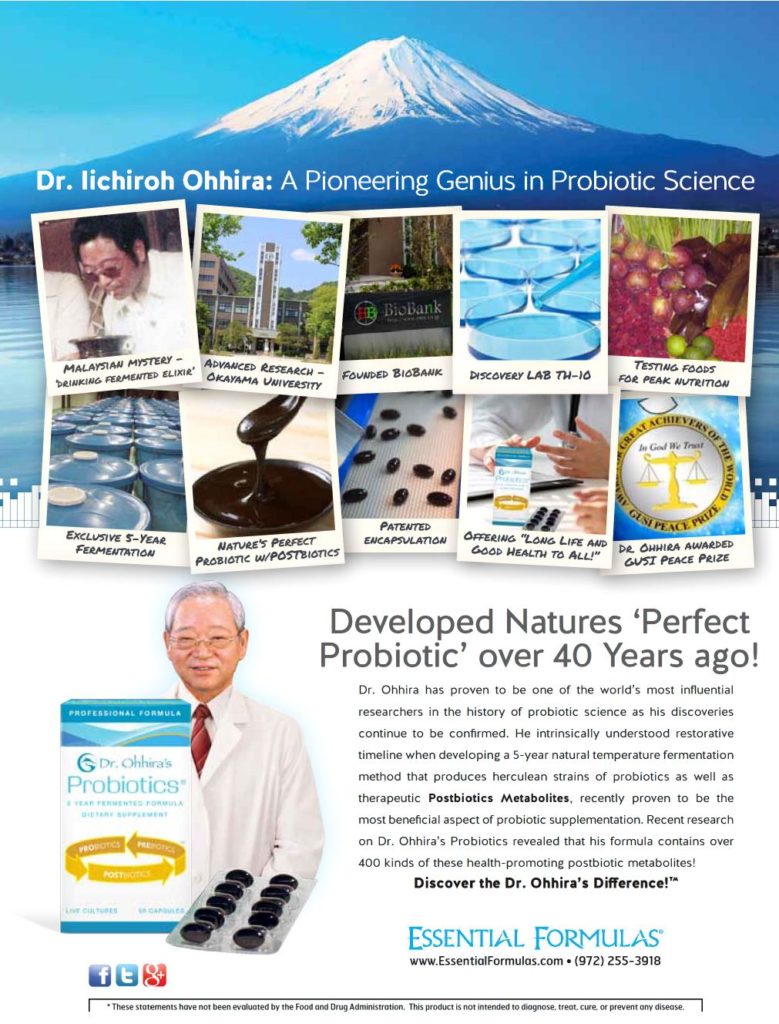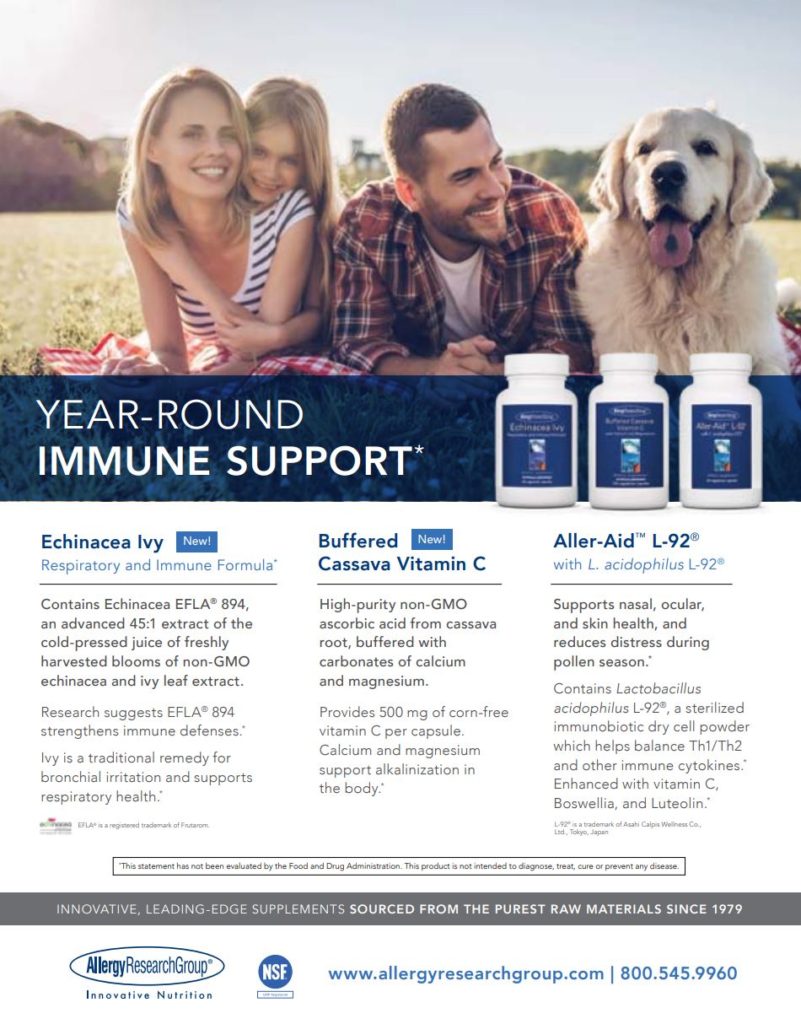…article continued:
Allergies. One study showed allergic rhinitis is associated with open-angle glaucoma.27
Obesity. Health problems such as obesity can also increase risk of glaucoma.28,29
Integrative Medical Approach
Through nutrition, diet, and lifestyle modification we can help nourish and support the health of the optic nerve for those with glaucoma or at risk of developing glaucoma.
Oxidative stress and free radicals may play an important role in the onset of glaucoma by causing damage to the trabecular meshwork responsible for effective outflow of the aqueous fluid, and the retinal ganglion cells.30-32 The optic nerve requires healthy circulation to the eyes and essential nutrients to maintain cell integrity and good vision. Research has shown that circulation to the optic nerve is poorer for those with glaucoma, particularly for normal or low-tension glaucoma.10 Glaucoma is not just a matter of normal IOP but also of keeping the optic nerve properly nourished. There are numerous nutrients that have been well researched as supporting circulation to the optic nerve and being neuroprotective as well (see causes above). Antioxidants play many roles to help reduce oxidative stress and damage due to free radicals,33 protect the trabecular meshwork,31 and support healthy circulation to the optic nerve.
Nutrients Related to Type of Glaucoma
Open-angle glaucoma. If you are already on eye medications for lowering eye pressure but would like to lower it further and lower it naturally, recommended nutrients include the following (any changes in medication should receive your eye doctor’s approval and management):
- For circulation: Ginkgo biloba and/or vinpocetine. Also, a good Liver tonic such as Revision, which is based on the classic Chinese medical model, helps support healthy circulation and movement of energy in the eyes.
- For optic nerve health: Coleus forskohlii, taurine, bilberry, grapeseed extract, magnesium, folate, vitamin B6, vitamin B12, N-acetylcysteine, alpha-lipoic acid, CoQ10, omega-3 fatty acids, and vitamin C.
- For helping reduce eye pressure: Coleus forskohlli, vitamin C, and alpha-lipoic acid.
Narrow or closed-angle glaucoma. If surgery is not needed and the eye doctor is monitoring the condition, then the following nutrients can be helpful in supporting optic nerve health:
- For circulation: Ginkgo biloba and vinpocetine. Also, a good Liver tonic such as Revision, based on the classic Chinese medical model (this formula was based on “rambling powder” of xiao yao san), helps support healthy circulation and movement of energy.
- For optic nerve support: Taurine, bilberry, grapeseed extract, magnesium, vitamin B12, N-acetyl-cysteine, alpha-lipoic acid, CoQ10, pyrroloquinoline quinone (PQQ), omega-3 fatty acids, and vitamin C.
- Eyedrops: Cineraria homeopathic eyedrops and Pleo Muc homeopathic eyedrops can help support circulation in the outer layer of the eyes.
Low or normal-tension glaucoma (the appearance of glaucoma is present with normal IOP). Changes resulting in thinning of the cornea, damage due to poor circulation, and/or lack of available essential nutrients may be improved using the same nutrients as in chronic glaucoma, but without the nutrients that can help lower eye pressure.
- For circulation: Ginkgo biloba and/or vinpocetine.34
- Optic nerve support: Combination of Ginkgo biloba and bilberry,35 as well as taurine, grapeseed extract, folate, vitamin B6, vitamin B12 (methylcobalamin), N-acetyl-cysteine, CoQ10, and pyrroloquinoline quinone (PQQ).36
Pseudoexfoliative glaucoma (PEX) is distinguished by clumps of amyloid protein that accumulate in the eye and ultimately end up blocking the outflow of aqueous humor by clogging the trabecular network. Recommended nutrients are those that are both natural anti-inflammatories and supporters of optic nerve health.
- Natural anti-inflammatories: These include omega-3 fatty acids, astaxanthin, vitamin D3, MSM, and herbs such as turmeric (curcumin), holy basil, resveratrol, ginger, digestive enzymes, and rutin.
- For optic nerve support: Taurine, bilberry, grapeseed extract, magnesium, vitamin B9, vitamin B12, N-acetylcysteine, alpha-lipoic acid, CoQ10, pyrroloquinoline quinone (PQQ), omega-3 fatty acids, vitamin C.
- Eyedrops: Pleo Muc homeopathic eyedrops, MSM drops (used as eyedrops), castor oil eyedrops, and cineraria maritima homeopathic eyedrops.
Essential Individual Nutrients
Antioxidants. Oxidative free radicals and reactive oxygen species (ROS) appear to damage the trabecular network, a key cause of glaucoma. It is well established that antioxidants are effective in reducing the presence of these antagonists. Treatment with the antioxidants vitamin E or N-acetyl-cysteine induced decreased ROS production in glaucoma trabecular meshwork (GTM) cells.31 We recommend 200 IU vitamin E or 600mg n-acetyl-cysteine three times daily.
Alpha-lipoic acid. 150 mg–300 mg per day. Alpha-lipoic acid is the only antioxidant that is both fat and water soluble. Studies have shown that it benefits people with glaucoma by enhancing color vision, general vision sensitivity, and helps protect nerve cells from damage.37 Alpha-lipoic acid is an ideal substance in the treatment of oxidative brain and neural disorders involving free radical processes. It is a powerful antioxidant and supports other antioxidants such as vitamin C and vitamin E. It helps to raise glutathione levels within cells.38 It has also been found to reduce neuronal damage due to over-stimulation by cyanide, glutamate, and iron ions, and protects nerve tissue.39
Aminoguanidine. 75 mg, 3 times per day. This is an anti-glycating agent that inhibits the ‘cross-linking’ or glycosylation of proteins. Glycosylation may cause, or at least contribute to, many of the problems of old age, such as cataracts, glaucoma, and macular degeneration. In an animal study, aminoguanidine was shown to help protect the optic nerve from damage.40
Bilberry (Vaccinium myrtillus). 180 mg–240 mg per day. The anthocyanin antioxidants contained in bilberry have long been confirmed to benefit vision. The combination of bilberry and Ginkgo biloba was found to be very helpful in a study involving over 300 patients with normal tension glaucoma. Another study finds that a combination of bilberry and French maritime pine bark (pycnogenol) could lower IOP up to 24%.41
Ginkgo biloba. 120 mg per day. Found to improve the visual field in some patients with normal-tension glaucoma,34 Ginkgo biloba supports vascular cell integrity, providing better delivery of antioxidants and nutrients to the optic nerve and related cell tissue.42 Ginkgo stabilizes cell tissue on the mitochondrial level (where our cells’ energy is manufactured). The mitochondria play a major role in several diseases, particularly neurodegenerative diseases, including glaucoma.43 Several studies have shown mitochondrial irregularities in glaucoma patients.44 Finally, ginkgo supports microcirculation.45
Taurine. 500 mg-1,000 mg per day. Taurine is an amino acid that protects the eyes against neurotoxin damage. Nerve-damaging toxins include excessive levels of glutamate, which may be responsible for ganglion cell death and optic nerve damage seen in open-angle glaucoma.46 It is recommended for glaucoma and retinal disease for its valuable antioxidant properties.47
Curcumin. 500 mg per day. Curcumin’s antioxidative capacity provides good protection for the nervous system, due to its anti-inflammatory, antioxidant, and anti-protein-clumping capacity.48
Vitamin B1 (thiamine). 50 mg-100 mg per day. Glaucoma patients tend to have low levels of vitamin B1.49
Vitamin B6. 100 mg daily. A combination of B6, B9 and B12 helps to lower homocysteine levels that are linked to higher risk of developing glaucoma.50 This is taken in divided dosages with food, often part of a vitamin B complex formulation.
Vitamin B9 (folate form). 800 mcg or more per day. Supplementing with folate may be helpful to those with the pseudoexfoliation (PEX) form of glaucoma.51
Vitamin B12 (methylcobalamin). 1,000 mcg per day (up to 1,000 mcg–1,500 mcg per day) may help protect vision in glaucoma patients.52





